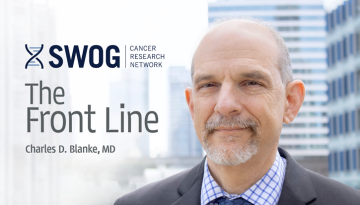Membership Profiles Will Answer "Who Are We?"
I am deeply honored to serve in the newly created role of SWOG's vice chair for Diversity, Equity, Inclusion, and professional Integrity (DEII), and as I settle into this role it is clear how much our community values each other and the work we all bring.
As we look towards our future, I aim to help steer SWOG through an integration of DEI principles into our membership, our work, and our trials, so that people with cancer, their advocates, and their loved ones characterize SWOG as a place where they are seen and heard, especially as we continue our efforts to modernize the clinical trial enterprise.
One of my initial goals is to better understand “who is SWOG?” Yes, we come from various institutions, some affiliated with universities and comprehensive cancer centers, others reflecting the community oncology research programs. We are clinicians, scientists, research personnel, advocates, and others who share in the pursuit of progress in the care of the person with cancer. We work in different parts of the country and the world and reflect both rural and urban communities.
Beyond that, though – who are we? I hope to bring an intersectional framework to answer that question. According to Wilson and colleagues¹, "intersectionality requires that we explicitly think about the ways that categories like race, gender, sexuality, and class interact with one another and shape our sense of self and of how we interact with the world." It's important to ask not only, "how many SWOG members are Asian?" As we strive for equity, we need the ability to look at ourselves in our multiple dimensions: "how many SWOG members are Asian and gay and male?" Part of the intent is to forge a sense of communities within SWOG. More important though, and perhaps to secure our future, it is to ensure that who we are and what we offer to our patients is both inclusive and representative of the world around us.
That is why one of my top priorities for 2023 is establishing the means to answer questions like these through a new-to-SWOG (but familiar to all of us) mechanism: a membership profile, a project led by Rick Bangs. The profile will include self-reported and membership department-validated information about each of us, and I appreciate the dedicated work in this work by our colleagues at CRAB. By the spring group meeting, we expect to have mock-ups of the first of three planned phases of this work available for you to see and respond to before we launch it for real. In the next several weeks, some of you will have an opportunity to review what we have done and what we plan to do. Stakeholder input is critical to our success, and I hope you will consider helping us move this initiative forward.
More information providing specifics on the vision, the design, and the implementation will follow, but it is vital that our efforts in DEI develop not in silos, but incorporated in to the very networks in which we operate. For now, I am working with Morgan Cox and The Hope Foundation to update our DEI website as a way to keep all apprised of our progress and our activities around DEI. I welcome your input and truly appreciate your support.
For the most current information on SWOG’s DEI activities at all times, please visit: Diversity, Equity, and Inclusion for All – The Hope Foundation
References:
1. Wilson Y, White A, Jefferson A, Danis M. Intersectionality in Clinical Medicine: The need for a conceptual framework. Am J of Bioethics 2019; 19: 8-19.
Other Recent Stories



